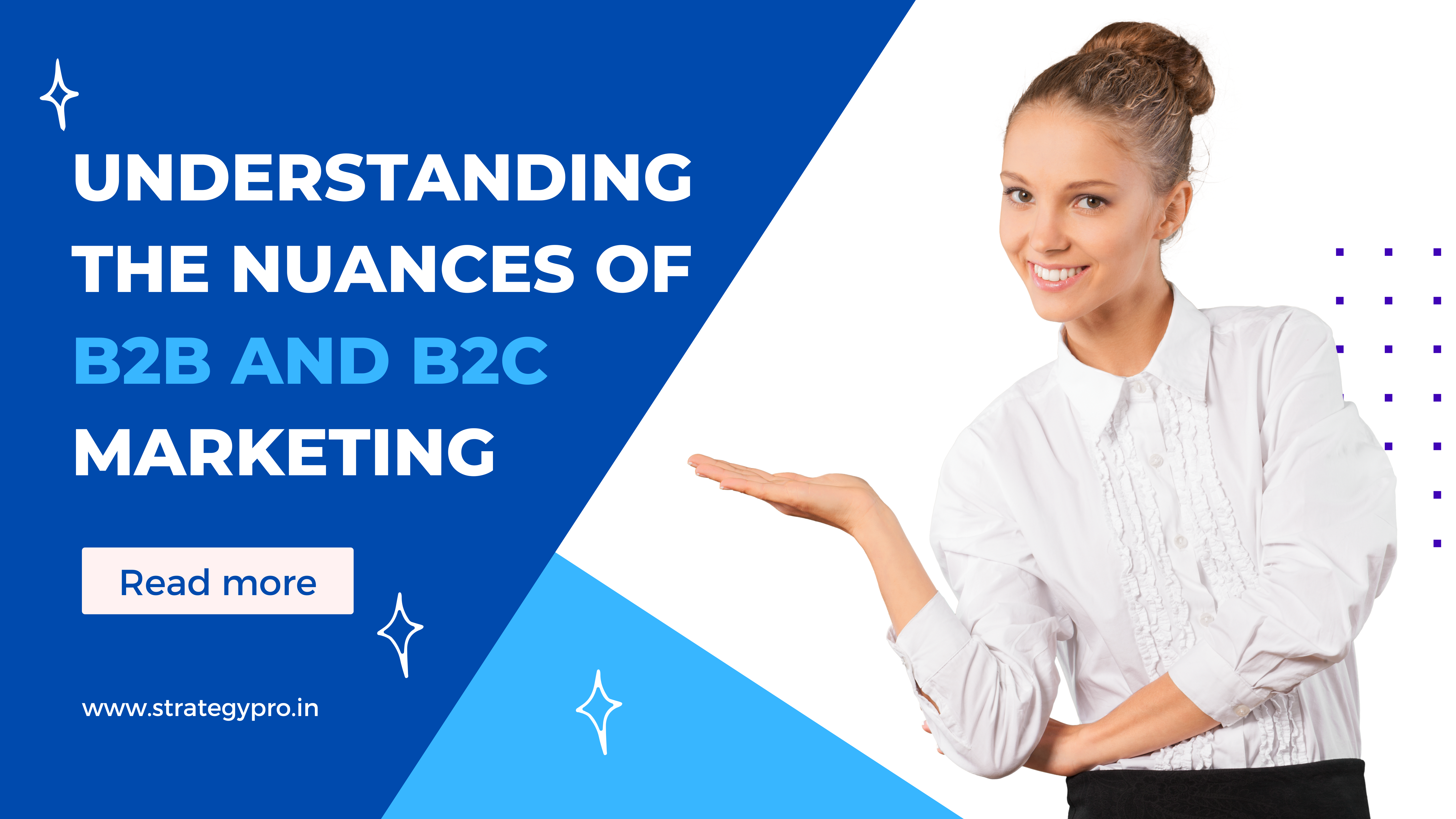
Understanding the Nuances of B2B and B2C Marketing
- By admin
Marketing is not a one-size-fits-all approach; it varies significantly depending on your target audience. Understanding the differences between B2B (Business-to-Business) and B2C (Business-to-Consumer) marketing is crucial for creating successful campaigns. While both aim to drive sales and build brand awareness, the strategies, messaging, and approaches differ markedly between these two types of marketing. This guide will help you navigate the complexities of B2B vs. B2C marketing, highlighting key differences, strategies, and tips for success.
What is B2B Marketing?
B2B marketing focuses on promoting products or services from one business to another, catering to the needs and challenges of organizations rather than individual consumers. It targets professionals, businesses, and organizations rather than individual consumers. The decision-making process in B2B is often more complex, involving multiple stakeholders, longer sales cycles, and a greater emphasis on the value and ROI of the product or service.
Key Characteristics of B2B Marketing
- Decision-Making Process: In B2B, decisions are often made by a group, such as a purchasing committee, requiring consensus among several stakeholders.
- Sales Cycle: B2B sales cycles are typically longer, as they involve research, evaluations, and multiple touchpoints before a purchase is made.
- Focus on Relationships: Building and maintaining long-term relationships is a cornerstone of B2B marketing, as trust and credibility are critical factors.
What is B2C Marketing?
B2C marketing, on the other hand, focuses on selling products or services directly to individual consumers. The goal is to create a strong brand connection that encourages immediate purchases. B2C marketing often involves emotional appeals, vibrant visuals, and incentives like discounts or loyalty programs to drive quick decisions.
Key Characteristics of B2C Marketing
- Decision-Making Process: Decisions are usually made by individuals and are often impulsive, driven by emotions or needs rather than extensive research.
- Sales Cycle: B2C sales cycles are shorter and often result in immediate purchases.
- Focus on Experiences: Creating memorable customer experiences and emotional connections are critical to B2C marketing success.
Key Differences Between B2B and B2C Marketing
1. Audience and Buyer Persona
In B2B marketing, the audience consists of professionals, decision-makers, and influencers within organizations. Crafting content that speaks to their specific needs, pain points, and professional goals is essential. B2C marketing, conversely, targets a broad consumer base with varied demographics and motivations, focusing on individual needs, desires, and lifestyle aspirations.
2. Sales Cycle Length
The sales cycle in B2B is significantly longer due to the need for detailed information, ROI analysis, and multiple approvals. B2C sales cycles are shorter, often completed in a single interaction, especially in e-commerce settings.
3. Content Strategy
Content marketing is essential in both B2B and B2C, driving engagement and influencing purchasing decisions across these distinct markets.
- B2B Content: Focuses on educational and informative content like whitepapers, case studies, webinars, and in-depth articles that establish thought leadership.
- B2C Content: Emphasizes engaging, visual, and entertaining content like social media posts, blogs, videos, and infographics that connect emotionally with the audience.
4. Marketing Channels
- B2B Channels: B2B marketers often rely on LinkedIn, industry blogs, email marketing, and professional networks to reach their audience. These platforms allow direct engagement with decision-makers.
- B2C Channels: B2C marketing thrives on social media platforms like Facebook, Instagram, TikTok, and YouTube, where brands can interact directly with consumers and create a strong brand presence.
5. Emotional vs. Rational Appeals
- B2B Marketing: Appeals are generally rational, emphasizing product benefits, cost savings, efficiency improvements, and ROI. The messaging is more straightforward and data-driven.
- B2C Marketing: Appeals often rely on emotional triggers, highlighting how the product can improve the consumer’s lifestyle, create happiness, or solve a personal problem.
Strategies for Success in B2B and B2C Marketing
For B2B Marketing
- Invest in Content Marketing: Create valuable content that positions your brand as a thought leader. This builds credibility and trust among potential clients.
- Leverage Account-Based Marketing (ABM): Focus on targeted marketing campaigns tailored to specific high-value accounts. ABM allows for personalized communication that addresses the unique needs of each client.
- Nurture Leads Through Email Campaigns: Use personalized email marketing to guide prospects through the sales funnel. Provide relevant content that addresses their pain points at each stage.
For B2C Marketing
- Utilize Social Proof and Reviews: Highlighting customer reviews, testimonials, and user-generated content can significantly influence consumer purchasing decisions.
- Offer Incentives and Discounts: Promotions, flash sales, and exclusive discounts create urgency and encourage quick purchases.
- Create Engaging Visual Content: High-quality visuals, videos, and interactive content help capture attention and drive engagement on social platforms.
Conclusion
Understanding the nuances of B2B and B2C marketing allows businesses to craft more effective strategies that resonate with their target audiences. Whether you’re focused on rational appeals in B2B or emotional connections in B2C, tailoring your approach to fit the unique dynamics of each market is key to success.
